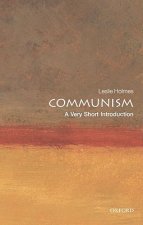
Kód: 04536279
Middle Class Without Democracy
Autor Jie Chen
What kind of role can the middle class play in potential democratization in such an undemocratic, late developing country as China? To answer this profound political as well as theoretical question, Jie Chen explores attitudinal ... celý popis
- Jazyk:
 Angličtina
Angličtina - Vazba: Pevná
- Počet stran: 240
Nakladatelství: Oxford University Press Inc, 2013
- Více informací o knize

Mohlo by se vám také líbit
-

Leveraged Buyouts
1091 Kč -

Going to the Mines to Look for Diamonds
778 Kč -

Dangerous Women Part 2
252 Kč -

Integration of Distributed Generation in the Power System
4097 Kč -

Amongst the Dead
368 Kč -

Unternehmen und Mythos
1505 Kč -

Les lumières de bougie
309 Kč
Darujte tuto knihu ještě dnes
- Objednejte knihu a zvolte Zaslat jako dárek.
- Obratem obdržíte darovací poukaz na knihu, který můžete ihned předat obdarovanému.
- Knihu zašleme na adresu obdarovaného, o nic se nestaráte.
Více informací o knize Middle Class Without Democracy
Nákupem získáte 262 bodů
 Anotace knihy
Anotace knihy
What kind of role can the middle class play in potential democratization in such an undemocratic, late developing country as China? To answer this profound political as well as theoretical question, Jie Chen explores attitudinal and behavioral orientation of China's new middle class to democracy and democratization. Chen's work is based on a unique set of data collected from a probability-sample survey and in-depth interviews of residents in three major Chinese cities, Beijing, Chengdu and Xi'an-each of which represents a distinct level of economic development in urban China-in 2007 and 2008. The empirical findings derived from this data set confirm that (1) compared to other social classes, particularly lower classes, the new Chinese middle class-especially those employed in the state apparatus-tends to be more supportive of the current Party-state but less supportive of democratic values and institutions; (2) the new middle class's attitudes toward democracy may be accounted for by this class's close ideational and institutional ties with the state, and its perceived socioeconomic wellbeing, among other factors; (3) the lack of support for democracy among the middle class tends to cause this social class to act in favor of the current state but in opposition to democratic changes. The most important political implication is that while China's middle class is not likely to serve as the harbinger of democracy now, its current attitudes toward democracy may change in the future. Such a crucial shift in the middle class's orientation toward democracy can take place, especially when its dependence on the Party-state decreases and perception of its own social and economic statuses turns pessimistic. The key theoretical implication from the findings suggests that the attitudinal and behavioral orientations of the middle class-as a whole and as a part-toward democratic change in late developing countries are contingent upon its relationship with the incumbent state and its perceived social/economic wellbeing, and the middle class's support for democracy in these countries is far from inevitable.
 Parametry knihy
Parametry knihy
Zařazení knihy Knihy v angličtině Society & social sciences Politics & government Political ideologies
2619 Kč
- Plný název: Middle Class Without Democracy
- Podnázev: Economic Growth and the Prospects for Democratization in China
- Autor: Jie Chen
- Jazyk:
 Angličtina
Angličtina - Vazba: Pevná
- Počet stran: 240
- EAN: 9780199841639
- ISBN: 0199841632
- ID: 04536279
- Nakladatelství: Oxford University Press Inc
- Hmotnost: 448 g
- Rozměry: 240 × 166 × 21 mm
- Datum vydání: 25. April 2013
Oblíbené z jiného soudku
-

The Communist Manifesto
84 Kč -

State and Revolution
173 Kč -

Communist Manifesto
193 Kč -

Communist Manifesto
200 Kč -

Mein Kampf
622 Kč -

The Unabomber Manifesto
251 Kč -

Capital
131 Kč -

Road to Serfdom
345 Kč -

The Communist Manifesto
50 Kč -

Anarchy and Christianity
401 Kč -

Rules for Radicals
268 Kč -

Imagined Communities
363 Kč -

Notes on Nationalism
71 Kč -

Blackshirts and Reds
345 Kč -

Why Liberalism Failed
404 Kč -

Psychopolitics
286 Kč -

Mein Kampf
767 Kč -

Capitalism, Socialism and Democracy
380 Kč -

ALL NEW Don't Think of an Elephant!
301 Kč -

Imperialism the Highest Stage of Capitalism
183 Kč -

Conscience of a Conservative
171 Kč -

Pentagon Papers
357 Kč -

Liberalism: A Very Short Introduction
233 Kč -

Poverty of Philosophy
215 Kč -

Road to Serfdom
514 Kč -

Rise of the Fourth Reich
258 Kč -

Inside The Third Reich
433 Kč -

Liberalism
346 Kč -

Abolition of Britain
433 Kč -

Communism: A Very Short Introduction
233 Kč -

Trotsky
433 Kč -

Anti-Duhring
664 Kč -

ABCs of Socialism
260 Kč -

Fascism: A Very Short Introduction
252 Kč -

Occult Roots of Nazism
481 Kč -

Politically Incorrect Guide to Socialism
429 Kč -

Fanged Noumena - Collected Writings 1987-2007
586 Kč -

Anatomy of Fascism
318 Kč -

Reform or Revolution and Other Writings
321 Kč -

Companion To Marx's Capital
566 Kč -

Liberalism
470 Kč -

Irreversible Damage
548 Kč -

Rights of Man, Common Sense, and Other Political Writings
187 Kč -

Communist Manifesto and Das Kapital
212 Kč -

Coming Insurrection
304 Kč -

The Virtue of Nationalism
542 Kč -

Economic and Philosophic Manuscripts of 1844
197 Kč -

Capital
258 Kč -

Communist Manifesto Illustrated
919 Kč
Osobní odběr Praha, Brno a 12903 dalších
Copyright ©2008-24 nejlevnejsi-knihy.cz Všechna práva vyhrazenaSoukromíCookies



 Vrácení do měsíce
Vrácení do měsíce 571 999 099 (8-15.30h)
571 999 099 (8-15.30h)